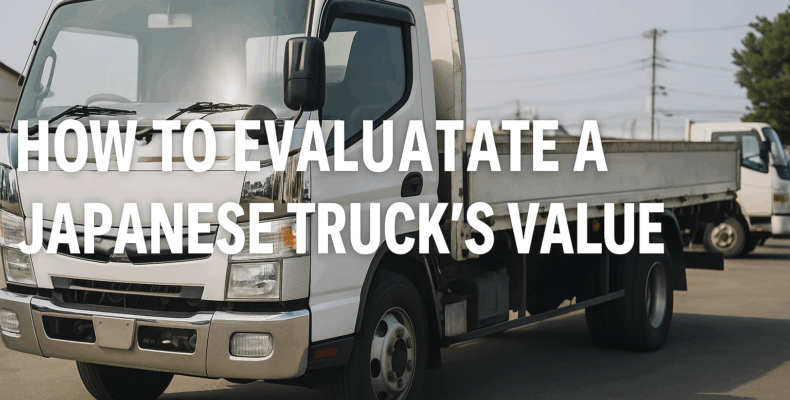Market Trends & Buyer Guides
How to Evaluate a Japanese Truck’s Value Before You Buy
Japanese used trucks are well-known for their reliability, durability, and long service life. But when shopping for one, especially for export, buyers must ask: Is this truck really worth the price?
Whether you’re a dealer, business owner, or independent buyer, this guide will help you evaluate a truck’s true value — so you don’t overpay or end up with hidden issues.
1. Mileage Isn’t Everything — But It Matters
Low mileage might seem ideal, but it’s not the only factor to consider.
Here’s why:
-
Some trucks may have low kilometers but suffer from poor maintenance.
-
Others with higher mileage may run like new if well serviced.
Check the truck’s service history.
A well-documented maintenance record is often more valuable than a low odometer reading alone.
2. Condition of the Body and Frame
Japanese roads are well-maintained, so rust is usually limited.
Still, check for signs of corrosion, especially around the undercarriage, wheel wells, and suspension.
Inspect:
-
Dents or repairs
-
Paint discoloration
-
Frame welds (which may indicate accident history)
3. Engine and Transmission Health
Smooth starting, no strange noises, and clean engine oil are all good signs.
For diesel trucks (which are common in Japan):
-
Look for signs of black smoke
-
Test for power delivery on acceleration
-
Review maintenance records for timing belt, oil filter, and injector service
4. Cabin & Interior Wear
Even though interior damage doesn’t affect drivability, it can indicate poor overall care.
Watch for:
-
Torn seats
-
Cracked dashboards
-
Broken AC or radio controls
These may signal that the truck wasn’t well-maintained.
5. Tire Condition and Brake Life
Tires should have even tread wear. Uneven patterns may suggest suspension or alignment issues.
Also check brake pads and rotors.
Replacing them overseas can be costly if missed upfront.
6. Auction Grade and Inspection Sheets
Many Japanese trucks come with auction inspection sheets.
These sheets include grades for:
-
Overall condition (Grade 3.5 to 5 is good)
-
Exterior and interior
-
Known faults or damage
If the truck was bought at auction, always review this document before deciding.
7. Choose a Trusted Exporter
The quality of your truck also depends on who you buy from.
Reliable exporters perform inspections, offer photos, and guarantee documentation.
👉 Check the Top 5 Trusted Japanese Used Truck Exporters for Global Buyers here:
https://everycar-review.com/2023/12/09/top-recommended-japanese-used-car-export-companies-for-international-customers/
These companies are based in Japan and have years of experience supporting buyers in Africa, the Caribbean, Southeast Asia, and the Pacific.
8. Check the Market Value
Finally, compare similar trucks across multiple listings.
Watch for:
-
Same model and year
-
Similar mileage
-
Condition and options (like power lift, air brakes, double cab, etc.)
This gives you a realistic market price range to work with.
Avoid offers that are too cheap — they often hide problems.
Final Thoughts
Evaluating a Japanese used truck’s value doesn’t require being a mechanic — just being observant, asking the right questions, and choosing a trustworthy partner.
By focusing on condition, service history, and exporter credibility, you can make a purchase that gives long-term reliability and ROI.
Ready to import?
There are many Japanese used cars, trucks, buses, and farm tractors available right now.
Check this link for the top trusted exporters to start your journey:
👉 https://everycar-review.com/2023/12/09/top-recommended-japanese-used-car-export-companies-for-international-customers/
